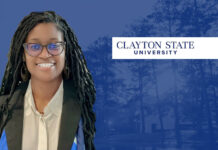 Students at the Reed College of Media at West Virginia University have teamed up with students at the School of Global Journalism & Communication at historically Black Morgan State University in Baltimore on a project called “Bridging Selma.”
Students at the Reed College of Media at West Virginia University have teamed up with students at the School of Global Journalism & Communication at historically Black Morgan State University in Baltimore on a project called “Bridging Selma.”
The Bridging Selma project is a technology-driven journalism project that takes a look at Selma today through the prism of the past. Students from each school traveled with faculty members to Selma and used photographs, videos and the written word to tell stories from the city past as well as investigating the community’s present and hopes for the future.
Assistant professor Karen Houppert was the faculty leader for the team from Morgan State University. She notes that “for many of the students, it was their first time in a southern town steeped in the conflicting imagery of Confederate tradition and daunting symbols of the civil rights struggle. Through multimedia storytelling and individual narrative, ‘Bridging Selma’ enabled students to learn about each other’s differences as well as their commonality while reporting stories that confront issues of race and social equity. These stories and their personal interaction taught them how to become part of this nation’s larger dialogue on race.”
The students’ journalism effort can be viewed here.











Why do HBCUs feel so compelled to partner up with HWCUs(Historically White Colleges and Universities) when conducting substantive research. Why do HBCUs continue to seek this mythical validation from those affiliated with HWCUs and the White academic establishment. For all of the bleeding hearts neoliberals, who will attempt to rationalize this endeavor as being for the best interests of students at HBCUs, that’s complete malarkey. Last point, who do you think will benefit the most from this colonial academic partnership?
Michael:
Your critique about the perils of a “colonial academic partnership” is an important one. I completely agree with you that HBCUs should not seek validation from HWCUs or the White academic establishment in conducting research. As one of the lead faculty on this project from West Virginia University, I can honestly tell you that we come from the viewpoint that the partnership is in the best interests of our students, whatever their racial positioning or socioeconomic background. Why? Because we as a College have a commitment to be critical of our of own practices that are mired in dominant discourses of social justice and race, and believe that it is central to the process of disrupting these discourses is to mine and trouble deficit narratives of blackness permeating the media and our nation, as well as the White academic establishment. Our goal with this collaboration is to create, with our students, new ways of approaching, thinking about and reporting on race and social justice. It is to mine the intersections of race, class and gender, and to explore what separates us along the urban-rural divides, as well as the social justice issues we have in common. The real challenge, as your comment rightly points out, is maintain a acute, self-critical awareness of carrying out this project within a system that is rigged to benefit a white, male, upper-class hegemony. We acknowledge that this task is not easy, and have more questions than answers, but believe it is worth the effort to open our students hearts and minds.